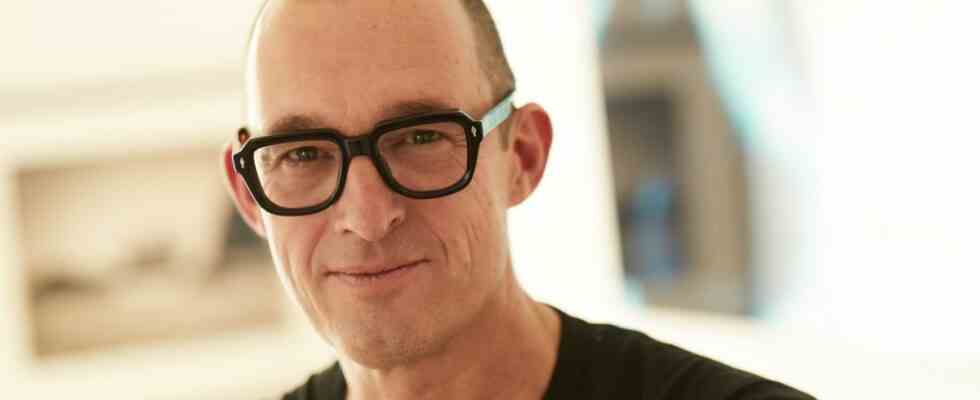The matte black cover has the word “Teer” written in shiny black capital letters, so it’s not without reason that one expects something a little darker between the covers. Something that paralyzes and sticks, like hot asphalt in a summer that is far too short. “Teer” is the name of the current volume of poetry by the poet and playwright Albert Ostermaier, in which he collects poems that were written between 2016 and 2021.
Ostermaier has a soft spot for darkness, not only figuratively, but also for the very physical, darkness as the absence of light. It appears as a motif in many of his plays and novels, sometimes even in the title, for example in his novel “Schwarze Sonne Scheine” (Black Sun Shines) and sets the starting point from which the reader should begin to feel. The world is a dark one, but also because the light can stand out all the better in front of it.
So what happens between the covers of “Teer” isn’t nearly as sinister as the presentation suggests, at least not in the final analysis. “Tar” is the condition that the poet braces against. A big “Nevertheless”. Yes, times are difficult, BUT!”. Yes, the separation hurts, but! Yes, being an author is difficult, but! Yes, there is still a pandemic, but let’s talk about the future. About the war in Ukraine Ostermaier didn’t know anything when writing these poems, one has to say that in fairness, because the poem he recently wrote about it leaves little hope for the moment.
Sea, waves and sand are recurring motifs
But back to “tar”. In lowercase sentences without periods or commas, many of the poems revolve around the thin skin of love and the often pathetic attempt to break away from a loved one. In the first poem “comment est ta peine” (roughly translated: “how is your pain?” by the way, there is a beautiful song of the same name by Benjamin Biolay) Ostermaier starts: “the pain doesn’t hurt anymore, the wind is a wind but it comes from the sea like a wave it hits my face with happiness”.
The sea, the waves (not the pandemic ones, also the literal ones), the sand, these are recurring motifs. He writes about the comfort of writing as well as the tremendous effort it takes at the same time. It is also a volume of Corona poetry, an examination of fears and longings that arose over time. In the poem “weights” then specifically: “I breathe into the crook of my arm but I won’t let myself be broken behind my hand.”
Albert Ostermaier is not afraid to put himself at the center of the emotion described. His lyrics are to be read as direct reactions to the world he experiences. It’s sedentary and sensitive, yes, but only cheesy in a few places. Especially since someone is at work here who unabashedly reveals references and makes it clear who inspires him. Again and again there are verses that seem to communicate with other works by Ostermaier. The poem “Phädra sleepless” describes the restless night of the unhappy lovers Phaedra and is reminiscent of “Phädra’s Night”, a play developed for the actress Bibiana Beglau at the Munich Residenztheater.
Albert Ostermaier, tar, poems. Suhrkamp, Berlin 2021. 119 pages, 18 euros.
In general, the theatre. Ostermaier is also attached to and suffers from this, perhaps especially during the lockdown, when the closed theaters began to question themselves intensively, even to the point of uncomfortable navel-gazing, unsure of where their place could be in the future. In the poem “Spielplan” Shakespeare’s Macbeth and Puck romp through the supermarket, Falstaff sits in the beer garden, but in “Lichtzeichen” Ostermaier ponders: “The theater has no future, I hear myself say”, “The theater is the display of the present.”
Then he becomes accusatory: “The theater is racist as long as it only pretends not to be, as long as we claim to be the better people, to have higher morals instead of deeper insight.” Next: “the theaters are going to remain closed who will unlock them again”. But in the end he also follows his own principle, to look from the dark into the light and he conjures up the future of the theater makers: “We have to feel it and stand barefoot on these boards and start telling what the future was and how we can win it back .” So much determination is touching.
You can also put it very briefly: Ostermaier is a romantic through and through. The turning to nature, to feeling as an extended space of possibilities beyond the factual, everything there. Even the blue flower appears, in a Corona poem about a ventilator: “the sky is crystal clear, the ether a blue flower in the lungs, just wait, you too will rest soon,” he writes in “der gipfel” based on Goethe’s “Wandrers Night song”https://www.sueddeutsche.de/kultur/.”but until then be thankful and keep writing.” So it’s no coincidence that the last poem in the collection is called “Hope Maybe”, a hint of hesitation that Ostermaier actually doesn’t see.

